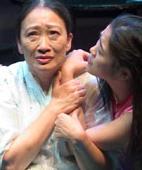SEARCH CurtainUp
REVIEWS
FEATURES
NEWS
Etcetera and
Short Term Listings
LISTINGS
Broadway
Off-Broadway
BOOKS and CDs
OTHER PLACES
Berkshires
London
LA/San Diego
DC
Philadelphia
Elsewhere
QUOTES
On TKTS
LETTERS TO EDITOR
FILM
LINKS
MISCELANEOUS
Free Updates
Masthead
NYC Weather
Comfort Women
By Jenny Sandman
|
We were not whores…we were innocent girls, abducted.
---Soonja Park
|

Tina Chen and Ji-young Kim
|
These women were between 14 and 19 and were either lured by deception or kidnapped outright and sold into brothels. They were forced to serve as many as 40 or 50 soldiers a day. If they showed any sign of hesitation or resistance, they were summarily executed. Most died or were ravaged by syphilis.
It was not until after demonstrations at the UN in 1994 that Japan formally apologized and started putting together a reparation program -- albeit one which was much smaller than reparations made to Korean soldiers and their families. When the women finally returned to Korea, they were shunned -- even by their own families. About 100 are still alive today.
The play uses the UN protest to bring together a young Korean NYU student and two surviving "comfort women" The girl brings the women home to talk to her lonely grandmother. This grandmother might herself have been a comfort woman had she not been married off to an old man (the Japanese tended to leave married women alone). While the grandmother avoided the comfort woman's service to the Japanese soldiers, her brother was conscripted into the Japanese army. He was stationed in Hiroshima, and returned home to die. The women brought home to meet the grandmother try to convince her to help both countries confront their pasts, but she wants only to forget, and doesn't want to "beg" for reparations. The But as the women talk, we discover that the grandmother has a deeper involvement in their cause than anyone knew or suspected.
It's a compelling story, but one that becomes a little harried. The performances, especially toward the end, are loud and breathless (the one exception is Haerry Kim as Mother). They are magnetic to a degree but largely one-note, particularly Jade Wu and Jo Yang as the "comfort women." Tina Chen is excellent as Grandma, but her protestations at the beginning give way to a largely unsatisfying denouement. The yelling, singing and the many brutal stories leave no time for the audience to rest or reflect.
Despite this sensory barrage, the overall effect is that of a small quiet play without larger ambitions or message and Urban Stages has given it an expressive production. The abstract, asymmetrical black and red stage has simple furniture and stark lighting, with the scrim adding dreamlike element. Heesoo Kim's costumes are authentic and evocative. Director Frances Hill keeps the action tight and the cast cohesive
The plight of the "comfort women" has become public in Korea only during the last fifteen years or so. With wartime human rights violations becoming rampant in Africa and the Middle East (rape, being foremost among them), this play could be a timely message on the wartime treatment of women. Kim avoids drawing larger parallels between then and now making this an interesting story that fails to feel fully fleshed out.
|
COMFORT WOMEN Written by Chungmi Kim Directed by Frances W. Hill With Tina Chen, Haerry Kim, Ji-young Kim, Jade Wu, and Jo Yang Set and Lighting Design by Roman Tatarowicz Costume Design by Heesoo Kim Sound Design by Jane Shaw Running time: One hour and thirty minutes with no intermission Urban Stages, 259 West 30th Street; 212-868-4444 10/23/04 to 11/28/04 Tuesday through Saturday at 8 pm, Saturday and Sunday at 3 pm. All tickets $35 Reviewed by Jenny Sandman based on October 29th performance |

Retold by Tina Packer of Shakespeare & Co.
Click image to buy.
Our Review

Mendes at the Donmar
Our Review

At This Theater

Leonard Maltin's 2003 Movie and Video Guide

Ridiculous!The Theatrical Life & Times of Charles Ludlam

6, 500 Comparative Phrases including 800 Shakespearean Metaphors by CurtainUp's editor.
Click image to buy.
Go here for details and larger image.



